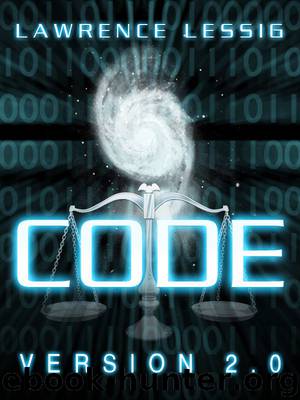Code version 2.0 by Lawrence Lessig

Author:Lawrence Lessig [Lessig, Lawrence]
Language: eng
Format: mobi
Published: 2011-02-14T05:00:00+00:00
I’ve surveyed a range of technologies to identify a common form. In each, the individual acts in a context that is technically public. I don’t mean it should be treated by the law as “public” in the sense that privacy should not be protected there. I’m not addressing that question yet. I mean only that the individual is putting his words or image in a context that he doesn’t control. Walking down 5th Avenue is the clearest example. Sending a letter is another. In both cases, the individual has put himself in a stream of activity that he doesn’t control.
The question for us, then, is what limits there should be—in the name of “privacy”—on the ability to surveil these activities. But even that question puts the matter too broadly. By “surveil,” I don’t mean surveillance generally. I mean the very specific kind of surveillance the examples above evince. I mean what we could call “digital surveillance.”
“Digital surveillance” is the process by which some form of human activity is analyzed by a computer according to some specified rule. The rule might say “flag all e-mail talking about Al Qaeda.” Or it might say “flag all e-mail praising Governor Dean.” Again, at this point I’m not focused upon the normative or legal question of whether such surveillance should be allowed. At this point, we’re just working through definitions. In each of the cases above, the critical feature in each is that a computer is sorting data for some followup review by some human. The sophistication of the search is a technical question, but there’s no doubt that its accuracy is improving substantially.
So should this form of monitoring be allowed?
I find when I ask this question framed precisely like this that there are two polar opposite reactions. On the one hand, friends of privacy say that there’s nothing new here. There’s no difference between the police reading your mail, and the police’s computer reading your e-mail. In both cases, a legitimate and reasonable expectation of privacy has been breached. In both cases, the law should protect against that breach.
On the other hand, friends of security insist there is a fundamental difference. As Judge Richard Posner wrote in the Washington Post, in an article defending the Bush Administration’s (extensive13) surveillance of domestic communications, “[m]achine collection and processing of data cannot, as such, invade privacy.” Why? Because it is a machine that is processing the data. Machines don’t gossip. They don’t care about your affair with your coworker. They don’t punish you for your political opinions. They’re just logic machines that act based upon conditions. Indeed, as Judge Posner argues, “[t]his initial sifting, far from invading privacy (a computer is not a sentient being), keeps most private data from being read by any intelligence officer.” We’re better off having machines read our e-mail, Posner suggests, both because of the security gain, and because the alternative snoop—an intelligence officer—would be much more nosey.
But it would go too far to suggest there isn’t some cost to this system.
Download
This site does not store any files on its server. We only index and link to content provided by other sites. Please contact the content providers to delete copyright contents if any and email us, we'll remove relevant links or contents immediately.
Nudge - Improving Decisions about Health, Wealth, and Happiness by Thaler Sunstein(7706)
Deep Work by Cal Newport(7082)
Principles: Life and Work by Ray Dalio(6445)
The Doodle Revolution by Sunni Brown(4758)
Factfulness: Ten Reasons We're Wrong About the World – and Why Things Are Better Than You Think by Hans Rosling(4742)
Eat That Frog! by Brian Tracy(4535)
Thinking in Bets by Annie Duke(4226)
Hyperfocus by Chris Bailey(4118)
Visual Intelligence by Amy E. Herman(3782)
Writing Your Dissertation in Fifteen Minutes a Day by Joan Bolker(3727)
Ogilvy on Advertising by David Ogilvy(3621)
Hidden Persuasion: 33 psychological influence techniques in advertising by Marc Andrews & Matthijs van Leeuwen & Rick van Baaren(3565)
How to Win Friends and Influence People in the Digital Age by Dale Carnegie & Associates(3561)
How to win friends and influence people by Dale Carnegie(3472)
The Pixar Touch by David A. Price(3437)
Schaum's Quick Guide to Writing Great Short Stories by Margaret Lucke(3378)
Deep Work: Rules for Focused Success in a Distracted World by Cal Newport(3237)
Work Clean by Dan Charnas(3122)
The Slow Fix: Solve Problems, Work Smarter, and Live Better In a World Addicted to Speed by Carl Honore(3009)
